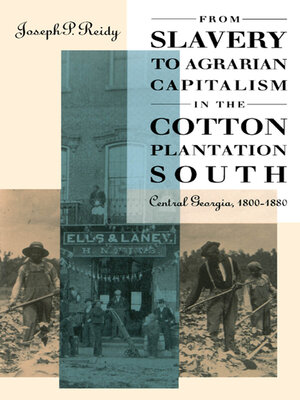From Slavery to Agrarian Capitalism in the Cotton Plantation South
ebook ∣ Central Georgia, 1800-1880
By Joseph P. Reidy

Sign up to save your library
With an OverDrive account, you can save your favorite libraries for at-a-glance information about availability. Find out more about OverDrive accounts.
Find this title in Libby, the library reading app by OverDrive.



Search for a digital library with this title
Title found at these libraries:
| Library Name | Distance |
|---|---|
| Loading... |
“Reidy has produced one of the most thoughtful treatments to date of a critical moment in southern history, placing the social transformation of the South in the context of 'the age of capital' and the changes in the markets, ideologies, etc. of the Atlantic world system. Better than anyone perhaps, Reidy has elaborated both the large and small narratives of this development, connecting global forces with the initiatives and reactions of ordinary southerners, black and white.” — Thomas C. Holt, University of Chicago
“Joseph Reidy’s detailed analysis of social and economic developments in central Georgia during and after slavery will take its place among the standard works on these subjects. Its discussions of the expansion of the cotton kingdom and of the changes after emancipation make it necessary reading for all concerned with southern and African-American history.” — Stanley Engerman, University of Rochester
“Successfully places the experience of one region’s people into the larger theoretical context of world capitalist development and in the process challenges other scholars to do the same.” — Rural Sociology
“Joseph Reidy’s detailed analysis of social and economic developments in central Georgia during and after slavery will take its place among the standard works on these subjects. Its discussions of the expansion of the cotton kingdom and of the changes after emancipation make it necessary reading for all concerned with southern and African-American history.” — Stanley Engerman, University of Rochester
“Successfully places the experience of one region’s people into the larger theoretical context of world capitalist development and in the process challenges other scholars to do the same.” — Rural Sociology







